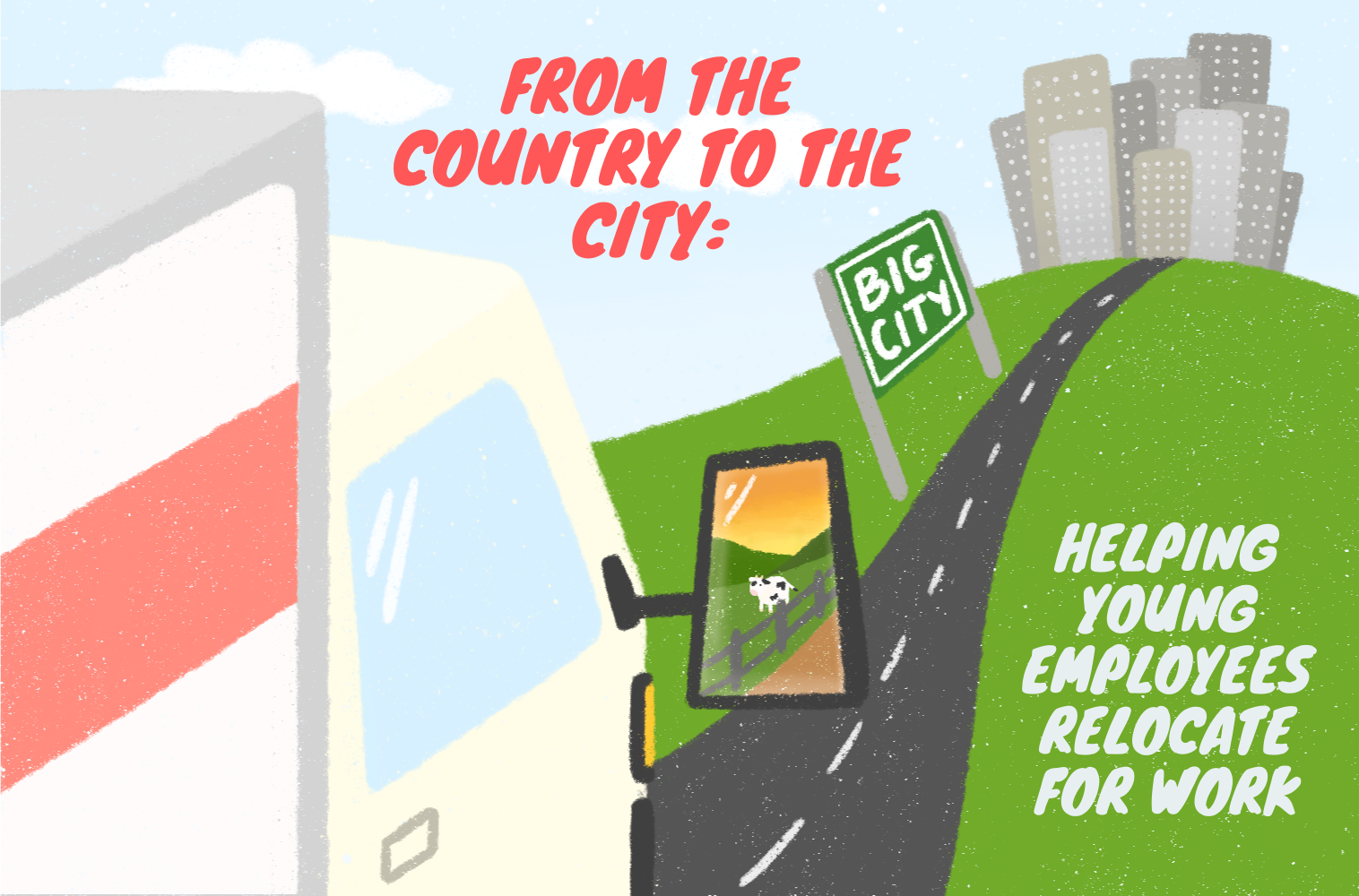As a former country dweller, I cannot emphasise the daunting transition between the simple countryside and a massive city. The countryside is a place of minimal traffic and large backyards. The city is a place of possibilities, motorways and skyscrapers. When I left the countryside for the big city, I had entered a different world. In this blog, I want to discuss how to support young employees when they are relocating from the country to the city. When you are young, impressionable and completely naive, having an employer looking out for you during a major change makes a significant difference.
City slickers vs country dwellers
To understand where I’m coming from, it’s essential to be aware of the major differences between the country and city lifestyles (and there are a lot). You may already be familiar these qualities, but this will provide relevant context.
The country:
- Traffic is minimal, and transport is efficient.
- Large open spaces including backyards, bushland, national parks etc.
- Fewer people, therefore, less likely for a pandemic outbreak.
- Fewer opportunities for career growth due to fewer businesses; therefore, younger people tend to work in hospitality or retail.
- Community vibe as many people know or are familiar with each other.
- Lasting reputations. As I said above, the community is smaller, therefore, if one establishes a reputation, it is harder to discard it.
- Affordable housing and cost of living- rentals and real estate are much more affordable.
- Next to no public transport- taxis or buses are generally the only other modes of transportation other than walking and driving.
- Limited education avenues such as university.
The city:
- Overwhelming amounts of traffic and travel takes time.
- Minimal space for large backyards or bushland due to buildings and roads.
- Large quantities of people increase the risk of pandemic outbreaks.
- Endless job opportunities due to thousands of jobs and companies.
- Community vibe within suburbs of the city; however, the greater city may not have this feeling.
- Due to larger community, it is easier to avoid a lasting reputation.
- Unaffordable cost of living and housing.
- Various public transport options.
- More opportunity for education such as universities.
The daunting move from the country to the city
From the list I have outlined above, you can see the differences between the two locations. As you can imagine, going from the quiet countryside to the bustling streets of suburbia would be quite a culture shock.
When Myrecruitment+ employed me, I lived in a country town with endless space and easy traffic conditions. It used to take me five minutes to get to work and seven minutes to get to the supermarket. However, there was no possible career growth for an aspiring writer. My options at my age are working in pubs, cafes, fast food or retail. I was desperate to move to an area where I could write to my heart’s content (and get paid for it).
Leaving my hometown and family behind was a difficult pill to swallow, but for my future I knew this was the right step to take. This applies too many young people in similar positions. The businesses that are relocating these people need to show they are worth this major commitment.

How can organisations support the relocation process?
Leading by example is a great way to smoothen the transition for a young employee to the city. If company leaders are calm, reliable and confident about the logistics of the big move, this will reflect onto the employee.
Virtual communication
Myrecruitment+ implemented a few strategies and gestures that made moving much more manageable. They conducted the interview process via Zoom; therefore, I did not commute seven hours to get to the office. Provide the opportunity for Zoom or other methods of virtual communication with a manager or the team for constant support and assistance.
Space & time
The recruiting and onboarding process was conducted online when I was given the job opportunity. Because of this, I was given the luxury of moving to get a new rental and hire a moving truck. I was given days off to organise affairs for my move and the liberty to work flexible hours until I officially relocated.
Advice on local information
Information such as directions, public transportation, local attractions, potential places to move, etc., can assist the employee in feeling more familiar with the new environment. If you are dealing with a young person, perhaps offer a tour of the business’ location.
Offering benefits
When I got offered the content creator position, I couldn’t believe my luck. The possibility of moving to the big city was exhilarating but terrifying. Leaving family behind and hauling your belongings to another town is one thing, but becoming used to the (vast) area, starting at a new job, and unpacking is exhausting and extensive.
I was able to work remotely straight away which financially supported during my move. I could complete my everyday tasks no matter my location for a month. This prevented unnecessary stress as I could work remotely until the move fell into place. This alleviated so much stress as I could afford rental deposits, bonds and a moving truck. Moving expenses are a common benefit offered to relocate employees, and for young and broke candidates, this would be a tempting offer.

Why it’s essential to accommodate a relocating employee
As I’ve reiterated a many times (and I’m sure you can relate to), moving towns at a young age is highly overwhelming.
- When onboarding a young employee, they are already nervous enough. Entering the big wide world with minimal experience whilst juggling adult responsibilities can derail anyone if not appropriately handled.
- Accommodating relocating employees can substantially affect their mindset, making things more seamless. This will benefit the relationship between both parties.
- Another thing to consider is that supporting a relocating employee is beneficial to your organisation. It will increase employee retention and satisfaction.
- A business’ best resources (and highest cost) are the people who bring creativity, productivity and ultimately profitability to a company. If you find the right candidate that checks all requirements and has a stellar personality, relocating them is worth the risk. During the onboarding process, allocating extra time and attention towards them will ensure that the employee is being taken care of as they have shown commitment to the organisation.
A young person moving away from everything they know is incredibly tough. But it does provide endless opportunities that should grasped whenever possible. Being aware of this when requesting a young employee to move will show a level of appreciation for the sacrifice that this person is undertaking. It will make them feel valued and understood which will increase the likelihood of them succeeding within their new environment.

